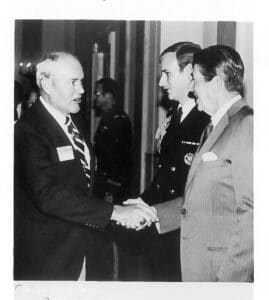Leaders and Legacies: Joe Paul Jones
As part of our 130th Anniversary celebration, we’re recognizing past leaders whose vision continues to drive us forward.
Working in a cubicle outside Joe Paul Jones’ office, I felt his presence even before I heard him walking down the hall.
He walked with such purpose to every footstep that, as soon as he rounded the corner, I could feel the ground announce him coming.

Joe Paul was a big man with a powerful presence and a deep devotion to improving his community and the engineering profession. He was a firm vice president and played a major role in fortifying Freese and Nichols as a national leader in professional organizations. And during his 44 years here, he had a huge hand in landmark projects that will have lasting impact.
For example, he managed a $54 million project to develop infrastructure systems during the initial construction phase of DFW International Airport. Later, he helped bring the long-envisioned Chisholm Trail Parkway to reality by leading a team that rerouted the 28-mile tollway so it didn’t cut through Fort Worth’s Cultural District, then he established a Chamber of Commerce task force that helped support the project to the finish line.
In 1971, Joe Paul was one of the first two engineers who weren’t Freese or Nichols family members to be admitted to the partnership. He was a retired lieutenant colonel in the U.S. Army Reserve and a Boy Scout leader, among many other ways in which he served.
He also used his influence as president of the National Society of Professional Engineers (NSPE) to advocate that engineers are better prepared to solve real-world problems if, along with technical education, they learn to communicate and have sensitivity for the world around them. He saw how fast the world was changing, and he wanted our profession to be ready for the challenges we’d face.

Joe Paul was NSPE president when I joined Freese and Nichols fresh out of college in 1993. I was a part of the Structural Department, over which he had oversight. He was out of the office quite a bit with his NSPE travels, but I did learn about NSPE when he was in the office, and I was intrigued. But that wasn’t the first way he influenced my career trajectory.
In the mid-1990s, our group worked on a project for a large hospital client, and my role was designing a pedestrian bridge that is very visible at the main entrance. Joe Paul was the principal-in-charge on the project, and I was a young design engineer working under the direction of our project manager. Over the Christmas break, hospital executives asked for a project update, but the project manager was off for the holidays.
Joe Paul took me to the client meeting — my first-ever meeting outside the office — prepping me in the car on the drive over. He then let me explain the details of our work to the hospital system’s chief operating officer. I was scared to death, but it went well.
Being able to meet with the client was a special experience that made a huge impact on my career. After that experience, I decided to pursue project management opportunities so that I could regularly interact with clients and owners. I eventually became a senior project manager on transportation, roadway design and planning projects. It all started with Joe Paul taking me to that client meeting.
He also brought me into the NSPE orbit with an invitation to a Texas Society of Professional Engineers luncheon. At that event, they asked for volunteers to help with MATHCOUNTS, a math-focused competition for middle school students.

I had participated in MATHCOUNTS in middle school in Oklahoma and had received a college scholarship from the Oklahoma Society of Professional Engineers. But it took that lunch with Joe Paul for me to connect it all. I volunteered at the MATHCOUNTS competition in Fort Worth, got increasingly involved with NSPE at the chapter, state and national levels, and served as NSPE president in 2020 and 2021.
While taking a leadership role in a professional organization requires commitment of time and energy, it also teaches leadership skills such as planning and leading meetings, and influencing people who aren’t in your chain of command or work for you. All those are valuable on the job. Having national relationships and a larger perspective on the profession also help the company as we continue our national growth.
Joe Paul steered me to that path, too, and I’m honored to follow in his footsteps.
A version of this article was originally published June 6, 2019.
